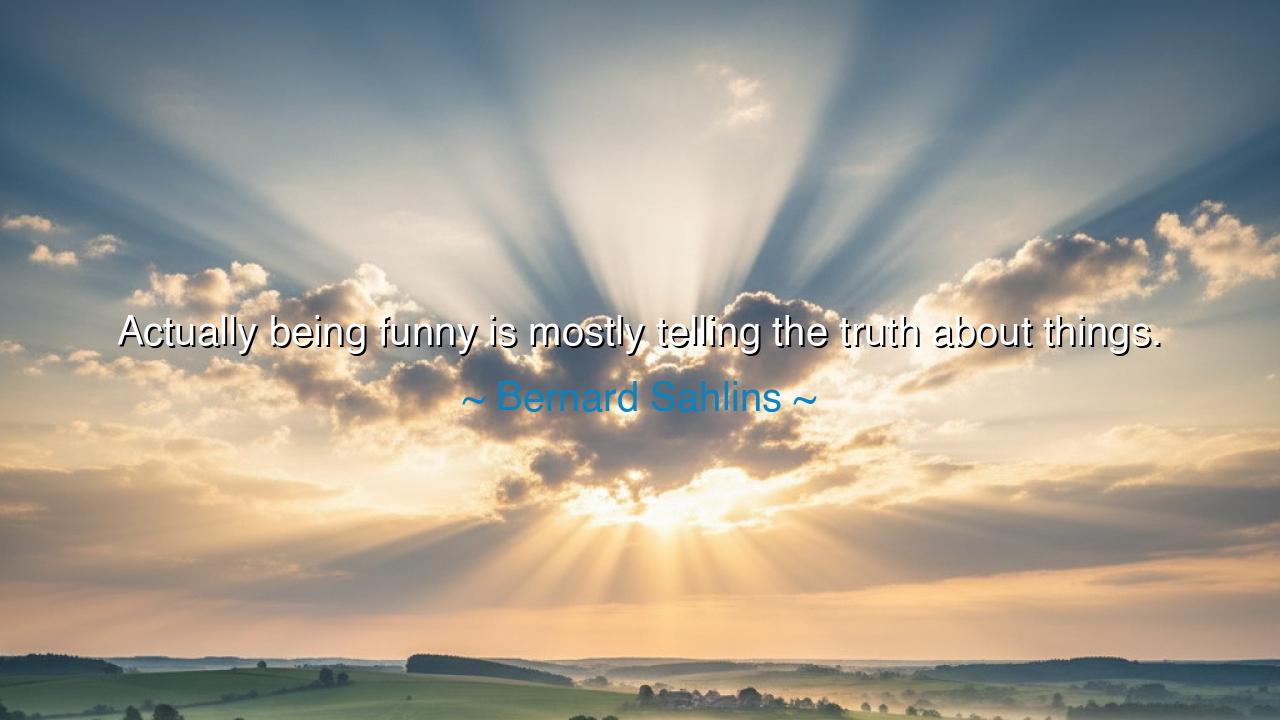
Actually being funny is mostly telling the truth about things.






“Actually being funny is mostly telling the truth about things.” – Bernard Sahlins
In the dawn of ages, when men gathered around the fire to share warmth and tales, there was always one among them — a jester, a fool, a philosopher cloaked in laughter. He would speak, and the people would roar with mirth, not because his words were merely amusing, but because, hidden in that laughter, they heard truth — sharp, unyielding, and undeniable. Bernard Sahlins, a master of theater and wit, gave form to this eternal insight: that to be truly funny is to be truthful. It is not the jest alone that stirs the heart, but the revelation behind it — the mirror held up to life’s contradictions.
Comedy, like a blade wrapped in silk, cuts through illusion. It reveals what solemnity dares not speak. The fool may mock the king, and yet it is he who tells the kingdom’s most honest tale. The laughter he summons is not born of cruelty, but of recognition — the sudden spark when one sees themselves as they truly are. For humor, in its highest form, is a language of truth spoken in the dialect of joy. It softens the blow of reality, allowing men to confront their follies without despair. Thus, being funny is not the art of deception, but the courage to speak truth with grace.
Consider the tale of Charlie Chaplin, that silent poet of the screen. In his shabby coat and bowler hat, he stumbled through a world of injustice and absurdity — a man small in stature but vast in spirit. His comedy did not mock for the sake of laughter; it unmasked the cruelty of the powerful, the hunger of the poor, the loneliness of the forgotten. In one of his greatest works, The Great Dictator, Chaplin dared to parody tyranny itself, turning fear into laughter and laughter into awakening. Behind every smile he evoked, there was pain made visible, and truth made bearable. That is the divine paradox of humor: it heals by revealing.
The ancients knew this too. In the courts of kings, the jester was the only one permitted to tell the truth. His motley clothes disguised his wisdom, and his laughter protected his life. While others flattered or feared, he jested — and through jest, he spoke what none dared utter. So it is with the comedian, the satirist, the honest soul who uses humor as a lamp in dark places. For laughter, when born of truth, is not mere entertainment; it is revelation disguised as delight.
Yet, how easily this sacred art is forgotten! Many seek laughter for its own sake — empty, hollow, without the heartbeat of honesty. But true humor does not mock the weak, nor flatter the powerful. It shines upon the contradictions of the human spirit — our vanity, our fears, our endless struggle to appear wiser than we are. When truth meets laughter, something sacred happens: shame turns to humility, and sorrow finds its echo in joy. The soul is freed from its pretense, if only for a moment, and reminded that we are all absurd — and all beautiful in our absurdity.
Therefore, to those who wish to be truly funny, seek not cleverness but clarity. Speak not from malice, but from understanding. Observe life as it is — raw, tender, and flawed — and let your words uncover the hidden harmony between pain and laughter. Do not fear to tell the truth, for the truth is the only soil from which humor grows. Without it, your laughter will be hollow; with it, your jest will endure through centuries.
And to all who listen — learn to laugh at yourselves. In that laughter lies wisdom. It is the laughter of the awakened, who no longer hide from the truth of their own hearts. Bernard Sahlins reminds us that the essence of being funny is not performance but perception — the divine ability to see life as it is, and still find it worthy of joy. So go forth, speak truth boldly, and let your laughter be a beacon — not of mockery, but of understanding. For in the end, the truest laughter is that which brings light.






AAdministratorAdministrator
Welcome, honored guests. Please leave a comment, we will respond soon